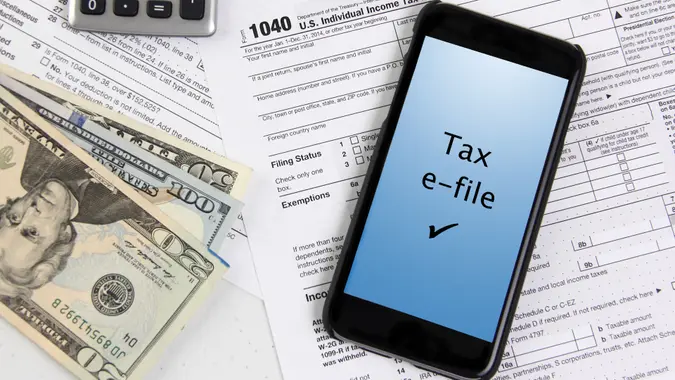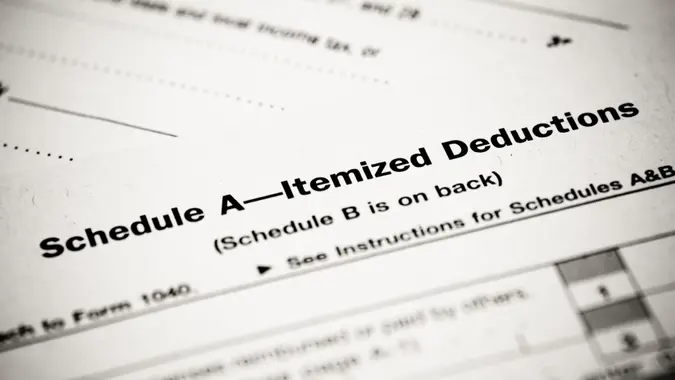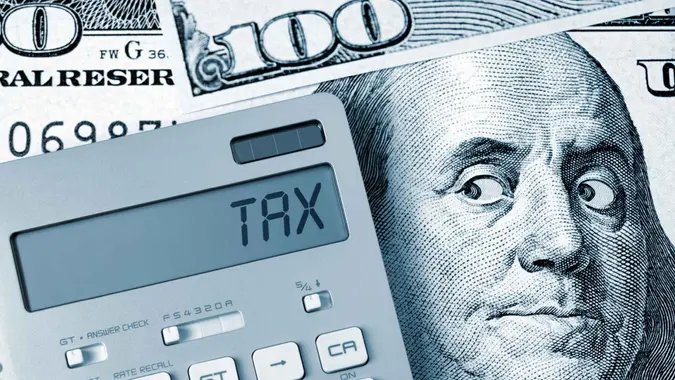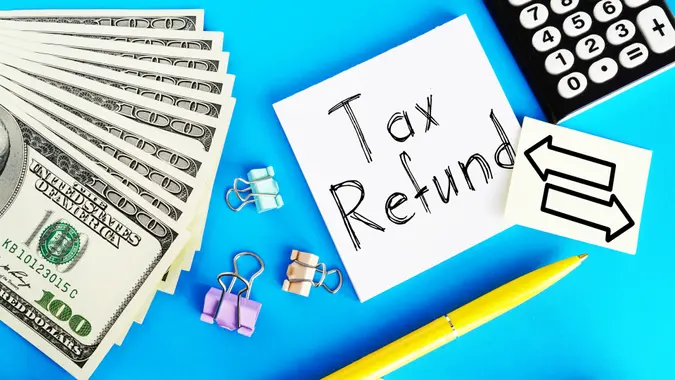Are Bonuses Taxed Higher? Here’s What You Need To Know

Commitment to Our Readers
GOBankingRates' editorial team is committed to bringing you unbiased reviews and information. We use data-driven methodologies to evaluate financial products and services - our reviews and ratings are not influenced by advertisers. You can read more about our editorial guidelines and our products and services review methodology.

20 Years
Helping You Live Richer

Reviewed
by Experts

Trusted by
Millions of Readers
You’ve worked hard to earn that long-awaited bonus. But you probably have one central question: are bonuses taxed higher than regular income?
You might be surprised to learn that the IRS imposes a withholding rate of 22% on the first $1 million in bonus income and 37% on any amount above that.
The 22% tax bill can make a bonus feel less exciting. But knowing the rules regarding bonus taxation can help you to prepare. Here’s what you need to know.
Are Bonuses Taxed Higher Than Regular Income?
The answer isn’t as straightforward as it seems.
The IRS has a 22% withholding rate for bonuses up to $1 million.
Your employer withholds taxes from your bonus, just as they withhold taxes from your paycheck. You won’t receive payment for the full bonus amount.
But a withholding rate is different from a tax rate. Here’s how bonus taxation really works:
The amount you owe for your bonus depends on your total income and tax bracket, so you might get some of the withheld tax back when you file your return. It’s a confusing system and can cause you to overpay on taxes throughout the year.
Here are some examples:
- If your total income puts you in a 12% tax bracket:
- The 22% bonus withholding is higher than your overall tax rate — you’ll likely get some of that money back during tax season.
- If your total income puts you in a 32% tax bracket:
- The 22% withholding is lower than your actual tax rate — so you may owe more when you file.
In addition to paying federal and state taxes on your bonus, you must pay the following FICA taxes on the income:
- Social Security
- Medicare
- Federal unemployment taxes
The bottom line — your employer withholds taxes from your bonus, just as they withhold taxes from your paycheck using one of the following two methods.
How Bonuses Are Withheld for Taxes
As the name implies, this method involves holding back a specific percentage of the bonus. Your employer may choose this option if it pays your bonus separately from your regular earnings or distinguishes it from your regular earnings.
Assuming the bonus amounts to $1 million or less, the employer will usually withhold 22% — the bonus tax rate for the tax year 2025.
Here are some examples:
- If you receive a $10,000 bonus:
- The employer will withhold $2,200 for income tax. The percentage increases to 37% on bonus earnings above $1 million.
- If you receive a $7,000 bonus:
- Your employer withholds 22%, or $1,540. Your take-home pay from the bonus is $5,460 before any additional taxes.
Aggregate Method
The aggregate method is the other way employers withhold taxes on bonuses. With this method, employers include the bonus pay with an employee’s regular earnings.
The IRS still defines bonuses as supplemental income. However, the employer treats the bonus portion as regular pay for tax withholding and uses the information on your W-4 form to determine what percentage of the total earnings to withhold.
The aggregate method can result in the employer withholding too much or too little, depending on the W-4 you have on file.
Here are some examples:
- Low withholding on your W-4:
- Imagine your W-4 has a low withholding amount. Your bonus might be under-withheld, which could lead to a surprise tax bill later.
- Side job and over-withholding on bonus:
- Now imagine you also have a side job in addition to your full-time job. If your employer over-withholds taxes on your bonus, that extra withholding can help offset taxes owed on your untaxed side income.
What To Ask Your Employer About Bonus Taxes
Employers tax bonuses differently, and you won’t know how your company handles the extra money until you ask.
Here are some of the most important questions to ask your employer about bonus taxes.
- Do you tax bonuses using the percentage or aggregate method?
- Can I review a copy of my W-4?
- Are taxes withheld from the gross or net bonus?
Good To Know
Your job’s accounting or human resources department can answer questions about your taxes, bonuses and other payroll concerns. Don’t be afraid to email or schedule a meeting to discuss.
Are Signing Bonuses Taxed the Same Way?
Signing bonuses are also treated as supplemental income and subject to the same taxes as other types of bonuses. You can expect a withholding rate of 22% for signing bonuses under $1 million.
The biggest difference is that signing bonuses might come with a clawback clause. Here are some points to know about this clause:
- You must repay the funds if you leave the company before a certain amount of time passes.
- The exact details are in your contract, so check it before you sign.
State Taxes: Do You Pay More on Your Bonus?
In some states, your bonus may be taxed differently than your regular wages.
- Supplemental tax rates: Some states apply a specific supplemental rate to bonuses and other extra income.
- Regular income tax only: Other states treat bonuses the same as regular income and tax them accordingly.
- No state income tax: If you live in a state with no income tax, you won’t pay any state tax on your bonus.
The following states have no state income tax, so your bonus will not be taxed at the state level. That’s great news for your wallet because it means you won’t pay any additional taxes.
- Alaska
- Florida
- Nevada
- New Hampshire
- South Dakota
- Tennessee
- Texas
- Washington
- Wyoming
These states, on the other hand, have some of the highest 2025 supplemental income taxes.
- Vermont: 30%
- New York: 11.7%
- California: 10.23%
- Oregon: 8%
- Minnesota: 6.25%
But remember, it’s always important to speak with your employer’s finance department or a tax professional if you have any questions about how these extra taxes will impact your income.
How Bonuses Can Affect Your Tax Refund
Bonuses can affect your tax refund and the amount you get back or owe. It’s a multistage process, and each step impacts the next.
- It starts with your bonus amount and how much your employer withholds.
- These factors affect how much you get paid when your company disburses the bonus.
- Later in the year, during tax time, your total income determines your IRS tax bracket.
- If your tax bracket is higher than the bonus withholding, you owe more money. If it’s lower, you probably get a refund.
How It Works
Wondering how your bonus affects your refund? Think of it like this:
- Bonus received ??’
- Withholding applied ??’
- Your tax bracket ??’
- Final tax bill ??’
- Refund or amount owed
Each step in the process impacts the next. If too much was withheld, you may get money back. If too little, you could owe at tax time.
Special Bonus Tax Rules
As mentioned, tax withholding depends on your tax situation. Special circumstances can subject you to a higher tax rate or place you in a different tax category.
Bonuses Over $1 Million
The IRS taxes your first $1 million in bonuses at the standard 22% tax rate. However, different rules apply to bonuses above $1 million.
All bonus money received over the $1 million threshold has a tax rate of 37%, so an employer using the percentage method will withhold 37% of that portion of the bonus for tax purposes.
Here’s an example:
- If you received a bonus of $1.1 million:
- The first $1 million would be subject to 22% withholding.
- The remaining $100,000 would be subject to 37% withholding.
Incentive Payments vs. Regular Wages
Incentive payments are treated differently than a bonus or paycheck. The IRS sees them as non-employee compensation — and they come with different tax rules.
Here’s an example:
Say you’re a car salesperson who gets a cash reward directly from the manufacturer. That payment doesn’t come from your employer, so it’s not taxed like your regular wages.
Here’s how it works:
- No taxes are withheld from these payments.
- You won’t get a W-2 for them.
- Instead, you’ll get a 1099-MISC or 1099-NEC from the company that paid you.
How to report it:
- If you’re an employee: Report it on Schedule 1.
- If you’re self-employed: Use Schedule C.
- You may also need to file Form 1040-ES to pay estimated taxes on the income.
How Can You Avoid Paying Taxes On Your Bonus?
While you can’t control how your employer withholds taxes from your bonus, there are smart ways to reduce the overall tax hit. With a little planning, you may be able to keep more of your bonus in your pocket come tax season.
Contribute to a Pre-Tax Retirement Account
Putting part of your bonus into a 401(k), Traditional IRA or HSA can lower your taxable income. Not only does this reduce the amount of income subject to tax, but it also helps you build long-term savings.
These accounts come in many forms, such as a health savings account, which you fund from pre-tax earnings to pay medical expenses. But most tax savings revolve around retirement accounts, such as a 401(k), IRA or Roth IRA.
For example, you might decide to max out your 401(k) for 2025 with a contribution of $23,500. Or you could focus on an HSA and add a maximum of $4,300 to lower your taxable income.
Defer the Bonus, if Possible
Some employers allow you to push your bonus into the next tax year. If you expect to be in a lower tax bracket next year, deferring could reduce the amount of tax you owe. This strategy works best if you know your future income will drop–for example, if you plan to retire or take unpaid leave.
Use Your Bonus To Cover Estimated Tax Payments
If your bonus pushes you into a higher bracket or your withholding isn’t enough to cover your total tax bill, consider using part of your bonus to make an estimated tax payment. This helps you avoid penalties and reduces the chance of a surprise tax bill in April.
While these strategies won’t change how your employer withholds taxes, they can help you manage the long-term tax impact of a bonus more effectively.
Pro Tip
You can use multiple tax-deferred accounts — even at the same time. Just be sure you meet the income limits for each one.
Bonus Planning Strategies for High Earners
If you’re a high earner, you might want to consider these additional strategies to minimize bonus taxes.
- Reduce income: Consider investing in tax-advantaged accounts like a 401(k) and IRA. You could also donate to charity or make catch-up contributions to retirement accounts.
- Tax-loss harvesting: You can offset some of the taxes you owe during high-income years by selling investments that have decreased in value. As an added benefit, it also helps with capital gains tax.
- Write-offs: If you own a business or work for yourself, you can take advantage of write-offs to lower your tax bill.
Planning for a bonus can help you fully prepare for the tax implications. Check with your employer to confirm how much they withhold, and ask for verification of that withholding, whether that’s on your paystub or in a separate document.
If you have any questions about other tax implications on your bonus, talk with your finance department or consult a tax professional.
FAQ
Here are the answers to some common questions about bonus taxes.- Do bonuses help my tax return?
- Generally, no, getting a bonus would not help your tax return. However, if you owe taxes on other income and had more than was necessary withheld from your bonus, you might end up in a better position come tax time. The additional tax withheld from your bonus could reduce the amount you owe on other income, or even help you break even.
- Why did I get taxed so much on my bonus?
- Bonuses are taxed at a higher rate than some tax brackets -- at least 22%. You might also find more withheld than you expected if your employer used the aggregate method to calculate the withholding.
- However, worry not -- if you did overpay the tax on your bonus, you should get it back with your tax refund.
- Are year-end bonuses taxed differently?
- Your year-end bonus is simply another form of supplemental income, so it will be taxed the same as any other bonus income.
- How do tax brackets affect bonus taxation?
- The IRS taxes bonuses up to $1 million at a flat rate of 22%. Your tax bracket doesn't impact the tax rate for your bonus. However, a large bonus could bump you up into a higher tax bracket, which would affect the tax rate you pay on your standard income.
Paige Cerulli, Daria Uhlig, Will Healy and Jami Farkas contributed to the reporting for this article.
Our in-house research team and on-site financial experts work together to create content that’s accurate, impartial, and up to date. We fact-check every single statistic, quote and fact using trusted primary resources to make sure the information we provide is correct. You can learn more about GOBankingRates’ processes and standards in our editorial policy.
- Internal Revenue Service. 2024. "Publication 15 (2023), (Circular E), Employer's Tax Guide."
- Internal Revenue Service. 2024. "Taxable and Nontaxable Income."
- Tax Foundation. 2025. "State Individual Income Tax Rates and Brackets, 2025."
- Internal Revenue Service. 2024. "401(k) limit increases to $23,500 for 2025, IRA limit remains $7,000."
 Written by
Written by  Edited by
Edited by 























